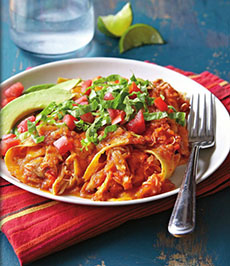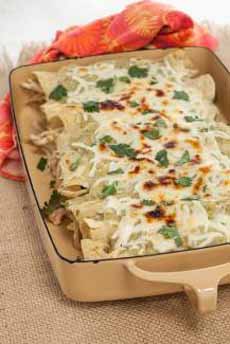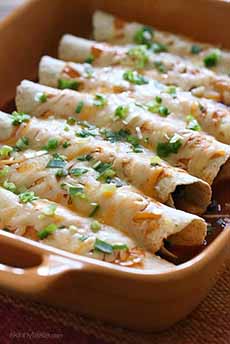Chicken Enchilada Baked Potato For National Enchilada Day
|
|
Who came up with the great idea to hold National Enchilada Day on Cinco de Mayo? We’d like to complain! Enchiladas deserve their own holiday, one that doesn’t get bundled in with the myriad foods and drinks served by Americans to celebrate Cinco de Mayo—which, by the way, is a holiday much more important to Mexican-food-loving Americans than it is to Mexicans. (Here’s the history of Cinco de Mayo.) So take this Chicken Enchilada Stuffed Baked Potato recipe (photo #1) and declare your own enchilada celebration on another day. > The history of enchiladas is below, along with more enchilada recipes. You can serve this stuffed baked potato for lunch with a salad, or as a first course for dinner. The potato takes the place of the tortilla, but the fillings are the same. If you like extra heat, garnish the potatoes with sliced fresh jalapeños before serving. This recipe was developed for the Idaho Potato Commission by Courtney Rowland of Neighbor Food Blog. 1. COMBINE the chicken, enchilada sauce, onion, green chilies, and garlic powder in a slow cooker. Cook on low heat for 6-8 hours or on high heat for 4 hours. 2. REMOVE the chicken and place it on a cutting board. Use two forks to shred the meat. Return the meat to the slow cooker to keep warm. 3. PREHEAT the oven to 425°F. Wash and dry the potatoes, and poke them several times with a fork. Set them on a large plate or a pan and drizzle them with olive oil to coat on all sides. Sprinkle them with kosher salt. 4. USING tongs, transfer the potatoes directly to the rack in the oven. Bake until fork-tender, about 45 minutes to 1 hour. When the potatoes are done, remove them from the oven. 5. MAKE a long slit down the center of each potato and use your fingers to pinch it together and get the potato to fan out. Sprinkle with salt and pepper. Butter if desired. Top each potato with chicken, chopped avocado, cheese, sour cream, and cilantro. Enchiladas are a food traced back to the ancient Mayans, who used their staple crop, corn, to make tortillas. The name for tortilla in the Yucatec language of the Mayas is tlaxcalli (las-COLL-ee), meaning small cake. The Spanish conquistadors changed the name to tortilla, meaning small cake in Spanish [source]. The oldest evidence of tortillas can be traced to about 10,000 B.C.E, in the Sierra Madre Mountains of Mexico, home to some of the Maya peoples [source]. The first enchiladas documented by the conquistadors were served at a feast soon after their arrival in 1519. Later, the first Mexican cookbook, “El Cocinero Mexicano,” recorded that the dish was a plain corn tortilla, rolled and dipped in chili sauce. It was in this simple form that tortillas were eaten as Mexican street food. In fact, in Mexican Spanish, “enchilada” is the past participle of enchilar, meaning “to season with chiles.” Traditional enchilada sauce is tomato-based and heavily seasoned with chiles. As early as the preclassical period (2000-250 B.C.E.), the Maya of the Yucatán Peninsula were dipping corn tortillas in pumpkin seeds, rolling them around chopped hard-boiled eggs, and covering them with tomato sauce. But the Aztecs were the first to develop the first modern, filled enchilada, using chiles. They were ground up into a spicy paste into which tortillas were dipped, then filled with beans, eggs, fish, game, or squash. Its Aztec language [Nahuatl] name, chīllapīzzali. literally means “chile-flute.” After the Spanish conquest of the Aztec Empire (1519 – 1521), the conquistadors appropriated much of its cuisine. Enchiladas had particular appeal: not just tasty, but simple to cook and could even be eaten on the march. New ingredients were added to meet Spanish tastes, including cheese, chicken and pork. Spicy sauces were used instead of Aztec chile paste which had previously been a basis of the Aztec version [source]. Thus began the enchiladas we know and love today. Today, you can find enchiladas stuffed with beans, beef, cheese, chicken, pork, or vegetables, served with traditional red enchilada sauce, mole sauce, spicy chile verde sauce, or creamy white sauce. There are enough variations to keep you in enchiladas for many years of National Enchilada Days! |
|
|
|
||







